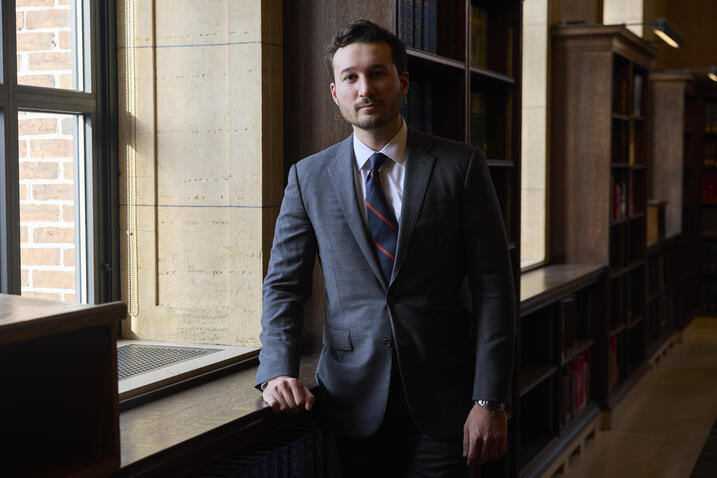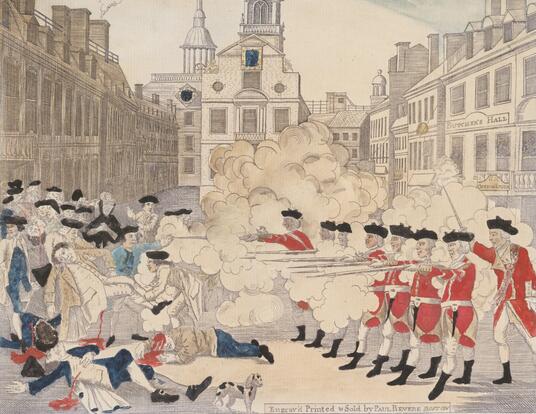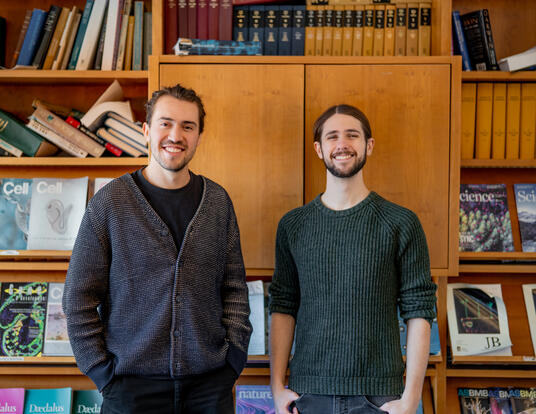A Dilemma for Democracy: To Prosecute or Not to Prosecute Political Leaders?
What happens to support for former presidents and prime ministers—and for democratic norms—when they’re taken to court?

In recent years, the former presidents of Brazil and the United States and the current leader of Israel have all been the targets of criminal prosecution—to name just a few of the dozens of political leaders who have faced prosecution globally. Supporters of the trials say they are necessary to preserve democracy and the rule of law. Opponents call the litigation election interference. But what effect do prosecutions against political figures have on support for them—or for democratic norms?
In a new study, Harvard Griffin GSAS PhD candidate Andrew O’Donohue and Columbia University political scientist Daniel Markovits explore how the prosecution of President Donald Trump shaped public opinion before the 2024 election. In a recent conversation with Harvard Griffin GSAS Communications, O’Donohue talks about the study’s findings, why they should give pause to those on the left and right looking to prosecute political opponents, and the growing global problem of how to deal with leaders who violate democratic norms.

In your study, you note that since 2000, more than 75 former presidents and prime ministers in global democracies have faced criminal prosecution. Is this a growing problem around the world?
A big trend affecting democracies globally is that courts and the legal system have become increasingly important actors in conflicts over democracy. During the Cold War, when democracies predominantly died through military coups, courts were rarely power brokers. But today—in the United States, Israel, Brazil, and many other countries—courts are powerful and play a critical role in shaping democratic trajectories.
One way this plays out is in the increasing number of cases where courts adjudicate the fate of political leaders: Donald Trump in the United States, Jair Bolsonaro in Brazil, Bibi Netanyahu in Israel. A key goal of our paper was to put US democracy in this broader global context. In political science, American politics is often studied separately from politics in the rest of the world. But it’s increasingly important for scholars of American and comparative politics to collaborate as the US democracy grapples with challenges that other democracies are facing too. That’s something my coauthor and I tried to do in this paper—to bridge that divide.
And in order to do that, you focused on the 2024 US presidential election. How was your research designed?
One of our key motivations was the realization that although Americans broadly knew that former President Donald Trump was being prosecuted, there were starkly different narratives about the prosecution’s legitimacy. One narrative viewed the prosecution as democratic accountability; another saw it as election interference. We wanted to investigate which of those narratives was persuasive, particularly to independents and Republicans, in the context of the 2024 Republican primary.
We chose the primary because in our current polarized political environment, it’s rare for voters to cross party lines. But in a primary, there’s more room to observe whether the prosecution might reduce support for Trump—or instead rally voters around him. So, we surveyed 3,000 Republicans and independents to understand how different messages for or against the prosecution affected their views of Trump, the prosecution, and democratic norms.
The paper refers frequently to "democratic norms." How did you define that term for the purposes of your study?
Democratic norms are the unwritten rules that make democracy work. As two of my mentors, [Harvard political scientists] Steve Levitsky and Daniel Ziblatt, have argued, they’re the glue that holds a democracy together.
In our survey, we asked about two core democratic norms: First, that political leaders should obey court decisions even when they disagree with them; and second, that the losers of elections should peacefully transfer power to the winners. What we found is that Americans broadly understand and support these norms in the abstract. About three-quarters of respondents said yes to both.
But the challenge comes in applying those norms when partisan interests are at stake. In those cases, our research shows people are much more willing to transgress democratic norms. Specifically, in the case of Trump’s prosecution, we found that rhetoric arguing for legal accountability had only a marginal effect on voter attitudes in the Republican primary—mostly among those already somewhat unfavorable toward Trump. The electorate is extremely polarized, with crystallized views of the former president, and that makes it very hard for legal interventions to change minds.
[We found] that Americans broadly understand and support [democratic] norms in the abstract. . . . But the challenge comes in applying those norms when partisan interests are at stake.
So, there's broad support for democratic norms in theory, but that doesn’t necessarily translate into practice.
That’s exactly right. In our survey, we asked respondents whether a Republican president should bring the FBI under direct presidential control, fire the prosecutors who charged Trump, or open criminal investigations into Democrats. Those actions would violate democratic norms.
We wanted to see whether the rule-of-law messaging would increase support for norms or, conversely, whether it would lead people to support retaliation if they felt those norms had already been violated. What we found was interesting: Trump’s rhetoric criticizing the prosecution had little additional effect—likely because most voters had already heard Trump’s narrative many times.
But when we exposed participants to the prosecutor’s argument—something fewer had heard—we saw two main effects. First, the prosecutor’s message marginally reduced the intention to vote for Trump among a small segment of Republicans who already had some reservations about him. But it also caused a major backlash among his core supporters, who became more galvanized against the prosecutor and the legal system.
If one of your main conclusions is that the prosecutions of President Trump did not dissuade his supporters from voting for him, is there anything new here?
We think so. First, we focused on the Republican primary, not the general election. We wanted to understand whether the prosecution influenced Republicans’ willingness to vote for Trump within that context, when voters had Republican alternatives. Even if Trump ultimately won the primary, the prosecution could have reduced his support by 10 percentage points—but he may still have prevailed due to other factors.
[Special Counsel Jack Smith’s] message marginally reduced the intention to vote for Trump among a small segment of Republicans who already had some reservations about him. But it also caused a major backlash among his core supporters, who became more galvanized against the prosecutor and the legal system.
Second, our study didn’t just look at support for Trump. We also examined how the prosecution affected trust in legal institutions and support for democratic norms. In a parallel study in Brazil, Fernando Bizzarro, Jean Vilbert, and I found that the prosecution of former president Jair Bolsonaro slightly reduced support for Bolsonaro but significantly decreased trust in the courts and support for democratic norms. In the US, we saw less erosion of support for democratic norms, but similar backlash against the legal officials involved. That broader theoretical framing is a key contribution of our research.
Through that broader framing, our research identifies what we call an “accountability dilemma.” Democracies are increasingly confronting leaders who violate norms. Prosecuting them can have the benefit of enforcing the rule of law, but also risks eroding trust in legal institutions and democratic values. There are no easy answers—just difficult trade-offs.
So, in Brazil, the prosecution negatively impacted support for democratic norms, but that didn’t happen in the US?
Correct. Both studies show that legal rhetoric has limited effects on reducing support for political leaders and that it often triggers backlash against legal institutions. But in the US, we actually found an increase in support for democratic norms among certain subgroups. That’s a major difference from the Brazilian case, where the prosecution led to reduced support for democratic norms.
There were those in both parties who argued that prosecuting President Trump would be politically advantageous—or dangerous. What does your research say about the political wisdom of prosecutions?
It was a fantasy to believe that prosecuting Donald Trump would significantly reduce his support among Republican voters. In a polarized society, legal rhetoric about accountability has little effect when voters have strongly held attachments to a political leader and may even reinforce narratives of persecution.
In Brazil, the courts didn’t just convict Bolsonaro—they banned him from running for office until 2030. That effectively took him off the political chessboard and created space for new leaders to rise on the political right. In the US, the prosecution sparked backlash, didn’t meaningfully reduce support for Trump, and left him politically active. So, it was in many ways the worst of both worlds: backlash without meaningful consequences.
Our research identifies what we call an “accountability dilemma.” Democracies are increasingly confronting leaders who violate norms. Prosecuting them can have the benefit of enforcing the rule of law, but also risks eroding trust in legal institutions and democratic values. There are no easy answers—just difficult trade-offs.
Finally, prosecutions of political opponents only seem to be increasing in the US. Based on your findings, what would you say to a political strategist—Republican or Democrat—about the impact it may have on their party’s fortunes?
First, I’d urge caution. Americans should oppose politicizing the legal system for partisan gain. In the case of Trump’s conviction in New York, for example, there were credible concerns that charges were brought only because Trump was a political figure. We should be equally skeptical of politically motivated prosecutions from either side.
Second, these prosecutions often have double-edged effects. They might reduce support for a political figure among centrist voters, but also rally the leader’s base. In the hypothetical case of [Texas Attorney General] Ken Paxton prosecuting [prospective senatorial opponent] Beto O’Rourke, our study suggests it might slightly dent O’Rourke’s support among moderates while simultaneously strengthening Democratic support for him and fueling backlash against Paxton.
Get the Latest Updates
Join Our Newsletter
Subscribe to Colloquy Podcast
Simplecast





